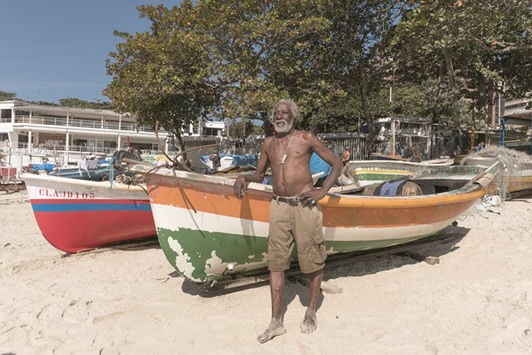The day doesn’t start too badly for fisherman Celmo Mantovani. His patch, the Copacabana, is at its best at 5.30 in the morning, the rising sun streaks the sky with red and gold, and the Sugarloaf mountain rears up black against it.
Mantovani and a couple of colleagues push their 23-year-old boat, the El Shaday, into the water and the stuttering motor springs to life.
It’s a picture-postcard scene, a dream work place — but for Mantovani there’s a nasty surprise in store.
Right at the south end of the beach near the fort, hidden from most of the tourists, are the boats of Copacabana’s last remaining fishermen.
The five dingy houses are also probably Rio’s smallest favela, or slum.
It’s not clear how much longer the fishermen can last against the trawlers which now dominate the industry on this part of the Atlantic coast.
Bernardito Perreira Reis, 55, who can light two cigarettes at once, has been fishing here for 28 years and lives in the tiny favela, as does 40-year-old Marcos Ferreira.
The day’s catch is always divided into four, with two portions going to Mantovani, who owns the boat, and one each going to Reis and Ferreira.
The little boat chugs through the bay, around the fort and along the beaches of Ipanema and Leblon.
The chat starts typically for a group of genuine “Cariocas,” as Rio de Janeiro locals call themselves.
“We have the most corrupt politicians in the world,” says one. “A bunch of thieves.”
President Dilma Rousseff was recently suspended and has been replaced by the conservative Michel Temer. “He’s even worse than her.”
They haven’t forgotten the social policies put in place by Rousseff’s Workers Party which Temer has begun scaling back.
The boat’s first stop is in view of the Hilton Hotel, where buoys of white styrofoam a couple of hundred metres from the beach mark where the first of two nets is submerged in the waters of the Atlantic.
The net is 500 metres long and 3 metres wide.
The trio pull on the net until they have reeled it all in — but it’s empty aside from plastic bags.
Promises that Rio would clean up its environmental problems for the 2016 Olympic Games have not been fulfilled.
“It gets less and less,” complains of Mantovani of the day’s catch. He has a wife and two children to feed and has been fishing for 26 years.
When business is good, he earns around 277 dollars a month.
Then he notices that the net has rips dozens of metres long. “One of those big boats again,” he says.
Trawlers with enormous drag nets fish with impunity in the area, destroying the nets of the local fishermen in the process.
“I lost my best net here just last week,” says Mantovani.
The trawlers are supposed to remain 1.5 nautical miles offshore, but with no coast guard, navy or representative of the ministry responsible for fisheries in sight, there’s no one to stop them closing closer.
The local fishermen have always played fair with each other, says Mantovani. “We divide up the area and respect it,” he says.
Today, after ten minutes of bringing in the net the trio catch a plaice and a couple of skate, ending up with just four fish before they carry on to the second and final fishing ground.
The net sunk there cost around 1,500 to 2,000reais (460 to 614 dollars). There’s no money for any more.
In the near distance a trawler with a large Brazilian flag has thrown out a drag net. A dozen men are busily bringing it in, even using canoes and surf boards to help guide the net to ensure the catch is as big as possible.
Mantovani and his helpers begin bringing their own net in. But after a couple of minutes there’s a jerk as the net gets stuck and the boat begins to tilt.
The trawler’s large, close-meshed drag net, with tons of fish inside, is lying on top of their net.
Mantovani steers his boat up to the trawler and it looks as if the situation could escalate — one movement of the trawler and his boat could capsize. But the trawler’s crew simply ignore him.
“Here it’s the law of the jungle, even though this is our fishing ground,” says Mantovani.
Only once the trawler has drawn in its net and sailed away can he and his helpers bring in their own net.
But the net has been completely torn — several hundred metres, worth a couple of hundred reais, destroyed in one fell swoop.
Despite a life spent being toughened up by the sea, Mantovani is close to tears.
“They have to repay us,” he says and follows the trawler where he begins an argument with the captain.
The sight of a reporter and a photographer in the boat appears to influence his response. Reluctantly he tells Mantovani to approach the trawler, Temperanca 1.
And then three loads of fresh fish, mullet, are tipped into the boat, where they flap around, dying.
It’s not a particularly good fish — it will only fetch 5 reais a kilo, but Mantovani reckons they’ve given him about 200 kilos.
With the boat now low in the water they turn around and head back in the direction of Copacabana.
They won’t be able to replace the net with the proceeds from the fish, but it’s better than nothing.
The fishermen’s problems are just a microcosm of Brazil’s problems.
Though the country’s flag bears the motto “Ordem e Progresso” (Order and Progress), there’s little of it to see at Copacabana. —DPA

Fisherman Josu00e9 de Jesus Damasceno, nicknamed Caco, stands on a beach in Rio.
